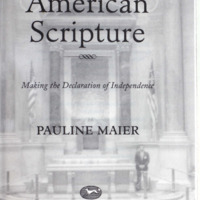-
Title
-
American scripture : making the Declaration of Independence
-
Description
-
Historian Maier shows us the Declaration as both the defining statement of our national identity and the moral standard by which we live as a nation. It is truly "American Scripture," and Maier tells us how it came to be. She describes the transformation of the Second Continental Congress into a national government, unlike anything that preceded or followed it. She lets us hear the voice of the people as revealed in other "declarations" of 1776. Detective-like, she discloses the origins of key ideas and phrases in the Declaration and unravels the complex story of its drafting and of the group-editing job which angered Thomas Jefferson. She also reveals what happened after the signing and celebration: how it was largely forgotten and then revived to buttress political arguments of the nineteenth century; and how Abraham Lincoln ensured its persistence as a living force in American society.--From publisher description.
-
Identifier
-
660430
-
679454926
-
Creator
-
Maier, Pauline
-
Format
-
1st ed.
-
Source
-
Brian Lamb Booknotes Collection
-
Gift of Brian Lamb, 2011.
-
Catalog record
-
Language
-
eng
-
Date
-
1997
-
Program air date: August 17, 1997
-
Publisher
-
Knopf
-
George Mason University. Libraries. Special Collections & Archives
-
Text
-
Transcription of Annotations
Notes on front endpapers: Comm of the Whole--Writers: Thomas Jefferson, John Adams, Roger Sherman (Cn), Robert Livingston (N.Y.), Benjamin Franklin. Work not of one man but many" p. 99. George Mason, John Locke, John C. Calhoun, Sam Adams, Thomas Paine-Jan. 9, 1776 Common Sense. Abe Lincoln (1850) v. Stephen Douglas, Richard Henry Lee, John Hancock, George III. French revolution failed because of Catholic priesthood p 188-89. Tues July 1 3 p.m. Why should Americans file by Declaration as if God? p 215. How well read were Adams and Jefferson, describe the two! What was Jefferson's "Summary View" (Charges against King George III). What role did Richard Henry Lee play overall. Comm to draft Dec. of Indp--no minutes p 97. Franklin-sick. All seemed on lots of comm. Charges against King--George III p. 108. Franklin-John Thompson, Hatter story p 149. Why didn't John Dickinson sign the Declaration p 150. John Hancock--sole signer/Why sign at all? Jan. 9--Paine's Common Sense published anonymously. Two problems Monarchy and hereditary rule (p. 31). Notes on front fly sheet: Jefferson's preamble to: 1. Virginia Constitution; George Mason's 2. Declaration of Rights; 3. English Declaration of Rights. Early 1720's Cat's letters--All men are born free. What King George III like--why was Jefferson so critical of him. Was he an 'absolute tyrant,. 9 colonies voted independence 4 New England states N.J., M.D., V.A., N.C., Georgia; S.C./Penn opposed, Delaware split, New York abstained. Jefferson companion Speaker vs. Writer. Notes on half title: 1st Continental Congress, 2nd Cont ", What started the Revolutionary War? What documents in history preceded the Declaration of Independence. King James II, King George III--Hiring German soldiers to fight the colonists alienated everyone. Underlinings/Notes: Underlinings: Shrine of Declaration/Constitution. Book focuses both on writing of Declaration and remaking of it into revered document. Background of Revolution, players, government, as a reaction, model for the ages. Notes: "History of the actual document," "Ft. Knox," "Japanese materials 'irony'," "1st looked at vital documents," "Bill of Rights," "grubby world of 18th century politics," "Jefferson overrated," "religious words and images," "April 18-19 1775," "John Adams, Treat Paine, Thomas Cushing," "Hancock," "1776 Jan. 9 Paine's Common Sense," "18 pence," "Athens, Rome republic," "British 132 ships sailed," "9 voted independence," "Jeff. 33," "1/2 century later," "Adams, Jeff. lived long," "against George III," "1st colonists attached to Britain," "emotion," "Adams on King as tyrant," "no standing army," "unalienable," "slaves, contradiction," "Indian," "19 charges not 21," "lesson attack on British," "Richard Henry Lee," "2 references God," "signed by everyone but John Dickinson," "Holy Writ," "read out loud," "King George's Head," "30 American newspapers," "no alternative," "John Adams celebrate the 44th," "no praise for T.J.," "George Mason's words," "not a classic statement," "Lafayette," "French Declaration of Rights," "Forgotten 1st 15 years," "30 years later," "Republicans v. Federalists," "Adams was critical," "John Locke," "Tom Paine v. John Adams," "John Trumball's painting," "Books 1819," "Biographies,"1824 Lafayette's tour," "last two survivors," "Jefferson's errors," "Jefferson's exaggerated role," "he alone," "Where was T.J." "Jefferson self-doubt," "slavery and T.J.," "tomb," "no appeal to God," "Roman Catholic," "S.C. wanted no rights because of slavery," "people's right to replace government," "quest for equality," "Indiana's John Petit," "Lincoln," "1850's," "To Lincoln," "Adams, Jefferson's July 4th death, God's plan," "325 letters on a panel," not exact," "Richard Henry Lee," "Archibald MacLeish problem," "Archives why file by," "Joseph Ellis, Jack Rakove."
-
Subject
-
"United States. Declaration of Independence."
-
Relation
-
Original Booknotes interview
-
Rights
-
This work may be protected by copyright laws and is provided for educational and research purposes only. Any infringing use may be subject to disciplinary action and/or civil or criminal liability as provided by law. If you believe that you are the rights-holder and object to Mason’s use of this image, please contact speccoll@gmu.edu.
 660430.pdf
660430.pdf